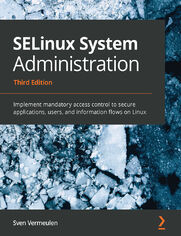SELinux System Administration - Helion

Tytuł oryginału: SELinux System Administration
ISBN: 9781800208537
stron: 459, Format: ebook
Data wydania: 2020-12-04
Ksi─Ögarnia: Helion
Cena ksi─ů┼╝ki: 139,00 z┼é
Enhance Linux security, application platforms, and virtualization solutions with SELinux 3 to work within your boundaries, your rules, and your policies
Key Features
- Learn what SELinux is, and how it acts as a mandatory access control system on Linux
- Apply and tune SELinux enforcement to users, applications, platforms, and virtualization solutions
- Use real-life examples and custom policies to strengthen the security posture of your systems
Book Description
Linux is a dominant player in many organizations and in the cloud. Securing the Linux environment is extremely important for any organization, and Security-Enhanced Linux (SELinux) acts as an additional layer to Linux system security.
SELinux System Administration covers basic SELinux concepts and shows you how to enhance Linux system protection measures. You will get to grips with SELinux and understand how it is integrated. As you progress, you'll get hands-on experience of tuning and configuring SELinux and integrating it into day-to-day administration tasks such as user management, network management, and application maintenance. Platforms such as Kubernetes, system services like systemd, and virtualization solutions like libvirt and Xen, all of which offer SELinux-specific controls, will be explained effectively so that you understand how to apply and configure SELinux within these applications. If applications do not exert the expected behavior, you'll learn how to fine-tune policies to securely host these applications. In case no policies exist, the book will guide you through developing custom policies on your own.
By the end of this Linux book, you'll be able to harden any Linux system using SELinux to suit your needs and fine-tune existing policies and develop custom ones to protect any app and service running on your Linux systems.
What you will learn
- Understand what SELinux is and how it is integrated into Linux
- Tune Linux security using policies and their configurable settings
- Manage Linux users with least-privilege roles and access controls
- Use SELinux controls in system services and virtualization solutions
- Analyze SELinux behavior through log events and policy analysis tools
- Protect systems against unexpected and malicious behavior
- Enhance existing policies or develop custom ones
Who this book is for
This Linux sysadmin book is for Linux administrators who want to control the secure state of their systems using SELinux, and for security professionals who have experience in maintaining a Linux system and want to know about SELinux. Experience in maintaining Linux systems, covering user management, software installation and maintenance, Linux security controls, and network configuration is required to get the most out of this book.
Osoby które kupowały "SELinux System Administration", wybierały także:
- Administracja systemem Linux. Kurs video. Przewodnik dla pocz─ůtkuj─ůcych 59,00 z┼é, (17,70 z┼é -70%)
- Gray Hat C#. Język C# w kontroli i łamaniu zabezpieczeń 57,74 zł, (17,90 zł -69%)
- Linux. Kurs video. Wprowadzenie do pracy z konsol─ů 99,00 z┼é, (49,50 z┼é -50%)
- Bash. Kurs video. Zostań administratorem systemów IT 99,00 zł, (49,50 zł -50%)
- Linux DevOps. Kurs video. Jenkins, Ansible, Terraform i Traefik 69,00 zł, (34,50 zł -50%)
Spis tre┼Ťci
SELinux System Administration. Implement mandatory access control to secure applications, users, and information flows on Linux - Third Edition eBook -- spis tre┼Ťci
- 1. Fundamental SELinux Concepts
- 2. Understanding SELinux Decisions and Logging
- 3. Managing User Logins
- 4. Using File Contexts and Process Domains
- 5. Controlling Network Communications
- 6. Configuring SELinux through Infrastructure-as-Code Orchestration
- 7. Configuring Application-Specific SELinux Controls
- 8. SEPostgreSQL – Extending PostgreSQL with SELinux
- 9. Secure Virtualization
- 10. Using Xen Security Modules with FLASK
- 11. Enhancing the Security of Containerized Workloads
- 12. Tuning SELinux Policies
- 13. Analyzing Policy Behavior
- 14. Dealing with New Applications
- 15. Using the Reference Policy
- 16. Developing Policies with SELinux CIL





